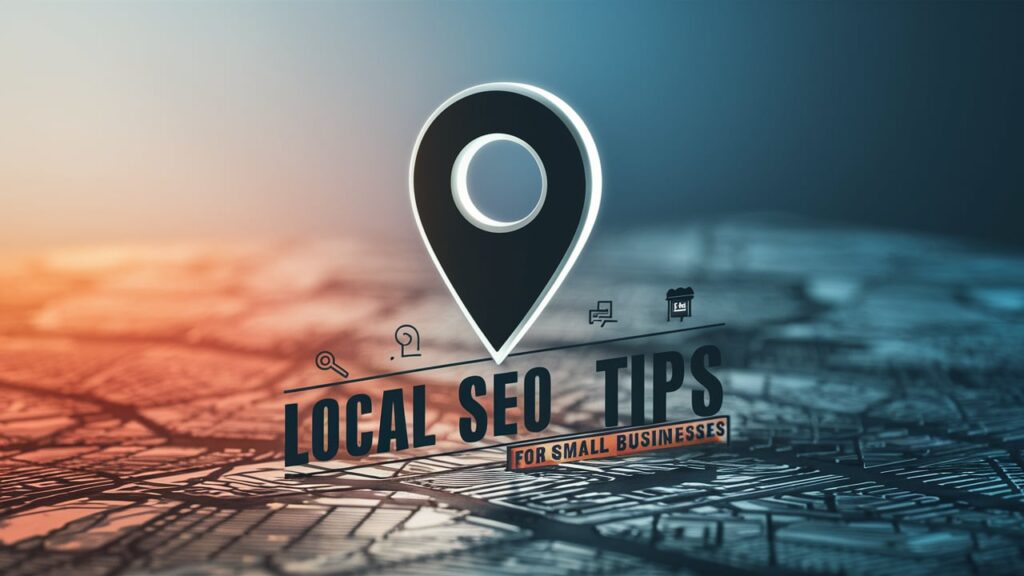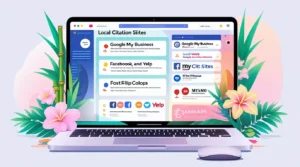Local SEO Tips for Small Businesses
In today’s digital age, local SEO has become an essential strategy for small businesses looking to attract customers in their vicinity. As search engines like Google continue to refine their algorithms, it’s crucial for small businesses to implement effective local SEO tips to ensure they stand out in local search results.
Jump to
ToggleIn this comprehensive guide, we’ll cover a range of SEO tips specifically tailored for small businesses aiming to improve their local online presence.
Local SEO
Local SEO focuses on optimizing your online presence to attract more business from relevant local searches. For small businesses, this means improving visibility in search results for queries related to their location and offerings. Effective local SEO can help your business reach potential customers who are searching for services or products in their area. By leveraging local SEO strategies, you can enhance your online visibility, drive targeted traffic to your website, and ultimately increase your sales.
In this blog post, we’ll explore key local SEO tips for small businesses, including optimizing your Google My Business profile, building local citations, encouraging customer reviews, and more. Each section will provide actionable insights and practical advice to help you implement these strategies effectively.
1. Optimize Your Google My Business Profile
One of the most important local SEO tips is to optimize your Google My Business (GMB) profile. Google My Business is a free tool that allows you to manage how your business appears on Google Search and Google Maps. Here’s how to make the most of it:
- Claim and Verify Your Listing: Ensure you claim and verify your GMB listing. This step is crucial for gaining control over your business information and improving your local search visibility.
- Complete Your Profile: Fill out all the information fields in your GMB profile. This includes your business name, address, phone number, website URL, business hours, and categories. The more information you provide, the better Google can understand your business and its relevance to local searches.
- Add Photos and Videos: High-quality photos and videos can significantly enhance your GMB listing. Upload images of your business premises, products, and services to give potential customers a better understanding of what you offer.
- Post Regular Updates: Use the Google Posts feature to share updates, promotions, and events. Regular posts can engage potential customers and keep your audience informed about your latest offerings.
By following these GMB optimization tips, you can improve your chances of appearing in local search results and attract more customers to your business.
2. Focus on Local Keywords
Incorporating local keywords into your SEO strategy is another essential tip for small businesses. Local keywords are search terms that include specific locations, such as city names, neighborhoods, or landmarks. Here’s how to effectively use local keywords:
- Conduct Keyword Research: Use tools like Google Keyword Planner, Ahrefs, or SEMrush to identify relevant local keywords for your business. Look for terms that potential customers are likely to use when searching for products or services in your area.
- Optimize On-Page Elements: Integrate local keywords into your website’s on-page elements, including the title tags, meta descriptions, headers, and body content. For example, if you run a bakery in New York, you might use keywords like “New York bakery” or “best bakery in NYC.”
- Create Location-Specific Content: Develop content that targets local keywords and addresses the needs and interests of your local audience. This could include blog posts about local events, guides to local attractions, or case studies showcasing your work with local clients.
By strategically using local keywords, you can improve your website’s relevance for local searches and increase your chances of ranking higher in search results.
3. Build Local Citations
Local citations are online mentions of your business’s name, address, and phone number (NAP). Building and maintaining accurate local citations is crucial for local SEO. Here’s how to do it effectively:
- Submit Your Business Information to Local Directories: Ensure your business is listed on popular local directories like Yelp, Yellow Pages, and TripAdvisor. These directories can drive traffic to your website and improve your local search visibility.
- Ensure Consistency: Consistency is key when it comes to local citations. Make sure your NAP information is consistent across all directories and online platforms. Inconsistent information can confuse search engines and negatively impact your local SEO.
- Leverage Industry-Specific Directories: In addition to general local directories, consider submitting your business to industry-specific directories relevant to your field. For example, if you own a dental practice, you might list your business on health-related directories.
Building and maintaining accurate local citations can enhance your business’s credibility and improve its visibility in local search results.
4. Encourage Customer Reviews
Customer reviews play a significant role in local SEO and can influence potential customers’ decisions. Here’s how to encourage and manage customer reviews:
- Ask for Reviews: Encourage satisfied customers to leave reviews on your Google My Business profile, Yelp, or other review platforms. You can ask for reviews via email follow-ups, social media, or in-store signage.
- Respond to Reviews: Engage with customers by responding to their reviews, both positive and negative. Thanking customers for positive feedback and addressing concerns in negative reviews demonstrates that you value their input and are committed to providing excellent service.
- Use Reviews to Improve Your Business: Pay attention to feedback and use it to make improvements to your products or services. Addressing common concerns or suggestions can help enhance your business’s reputation and customer satisfaction.
Positive reviews can boost your local SEO efforts by increasing your business’s credibility and attracting more potential customers.
5. Optimize for Mobile
With the increasing use of mobile devices for local searches, optimizing your website for mobile is essential for local SEO. Here’s how to ensure your site provides a seamless mobile experience:
- Implement Responsive Design: Use responsive web design to ensure your website adapts to different screen sizes and devices. A mobile-friendly design enhances user experience and reduces bounce rates, which can positively impact your local search rankings.
- Improve Page Load Speed: Mobile users expect fast-loading websites. Optimize your site’s performance by compressing images, minimizing code, and leveraging browser caching. Tools like Google PageSpeed Insights can help you identify and address performance issues.
- Ensure Easy Navigation: Make sure your website’s navigation is intuitive and user-friendly on mobile devices. Use large, clickable buttons and ensure that important information, such as contact details and business hours, is easily accessible.
A mobile-optimized website can improve user experience, increase engagement, and boost your local search visibility.
6. Leverage Social Media for Local SEO
Social media can complement your local SEO efforts and help you connect with your local audience. Here’s how to leverage social media for local SEO:
- Create Location-Based Content: Share content that highlights your local community, events, or partnerships. This can increase engagement and attract local followers to your social media profiles.
- Use Local Hashtags: Incorporate local hashtags into your social media posts to increase visibility among users searching for content related to your location. For example, if you’re a restaurant in San Francisco, you might use hashtags like #SFFoodie or #SanFranciscoEats.
- Engage with Local Influencers: Collaborate with local influencers or bloggers to promote your business. Influencer partnerships can help increase your reach and drive more local traffic to your website.
By actively engaging on social media and focusing on local content, you can enhance your online presence and support your local SEO efforts.
7. Monitor and Analyze Your Local SEO Performance
Regularly monitoring and analyzing your local SEO performance is essential for understanding the effectiveness of your strategies and making data-driven improvements. Here’s how to track your local SEO success:
- Use Google Analytics: Set up Google Analytics to track website traffic, user behavior, and conversions. Analyzing this data can help you identify trends, assess the impact of your local SEO efforts, and make informed decisions.
- Monitor Local Search Rankings: Use tools like Google Search Console, Moz, or SEMrush to track your local search rankings. Monitoring your rankings can help you understand how well your local SEO strategies are working and identify areas for improvement.
- Review Performance Metrics: Regularly review key performance metrics, such as click-through rates (CTR), bounce rates, and conversion rates. These metrics can provide insights into the effectiveness of your local SEO and help you optimize your strategies.
By continuously monitoring and analyzing your local SEO performance, you can refine your tactics and achieve better results over time.
Conclusion
Implementing effective local SEO strategies is crucial for small businesses looking to improve their online visibility and attract local customers. By optimizing your Google My Business profile, focusing on local keywords, building local citations, encouraging customer reviews, and leveraging social media, you can enhance your local search presence and drive targeted traffic to your website.
Remember to monitor and analyze your local SEO performance regularly to ensure your strategies are working effectively. If you have any questions or additional local SEO tips to share, feel free to leave a comment below. Your feedback and insights are always welcome!






